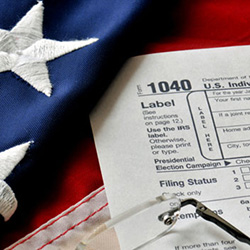Tax
Expat Americans Mustn't Miss Virus-Driven Tax Reliefs - ACA

American Citizens Abroad frequently calls on Washington DC's lawmakers and tax enforcement authorities to change how US expats are taxed, arguing that the country's worldwide system is unduly onerous.
An advocacy group for expat Americans argues they should get the same coronavirus-driven tax reliefs as those which apply to domestic US citizens.
The call has come in a message from American Citizens Abroad to legislators in Washington DC, ACA said in a statement.
Last week the Internal Revenue Service waived the late payment penalties and interest on tax due until July 15; the filing deadline is also postponed until the same date because of the disruption to economic activity caused by the pandemic.
ACA said such measures “must ensure that Americans living and working overseas are treated in the same manner as other taxpayers, and that special issues arising from the fact that they live outside the US are addressed, so as to avoid mistakes and unintended consequences”.
“All too often, as evidenced by the recent Tax Cuts and Jobs Act, consideration has not been given to how changes will affect the community of Americans overseas,” ACA said, referring to the 2017 legislation. At the time, the group criticized the “Transition Tax", enacted as part of the Act. The ACA said that expats who run small businesses will be unfairly caught up in its sights because the measure should be aimed at large corporations stashing foreign earnings offshore.
In its letter to Congress this week, ACA said lawmakers must examine “the mechanics of refunds, limitations based on gross income, and loans to small businesses”, to ensure that US-based citizens and expats are on the same page.
“The Congress, Treasury and IRS must ensure that Americans overseas are treated equitably. In many cases, US citizens overseas claim foreign tax credits, resulting in little or no US tax liability, even though they have significant adjusted gross income. These individuals should not be adversely affected, and they should not be subject to reduced refunds/credits,” Marylouise Serrato, ACA executive director, said.
The problems faced by US citizens living overseas has prompted a number of them to renounce their citizenship. It has also prompted specialist wealth managers to provide financial services for them. While estimates vary widely, there are said to be as many as eight million US expats. The plight of expats worsened a decade ago after the Obama administration enacted the FATCA legislation. The rules impose tougher reporting requirements on foreign financial institutions to prevent expats avoiding US taxes. As a result, banks such as HSBC and Deutsche Bank ceased to offer Americans an account. Some firms, such as MASECO, Schroders, RBC and London & Capital, however, continue to serve this population group.
UK position
According to Adam Smith, a partner at leading accounting and tax
advisory firm Blick Rothenberg, all American citizens including
those living and working in the UK have been given an extension
from April until July to make their returns.
“The effect of Coronavius on day-to-day life had caused US taxpayers to become increasingly concerned in relation to their tax affairs. Information required to complete 2019 tax returns was taking longer than usual and there have been concerns about cash-flow required for the usual April 15 tax payments. Either the cash was simply not available or fears that making large payments in April might endanger solvency in the coming uncertain months,” Smith said.
“The Internal Revenue Service have announced an extended due date of July 15, 2020 for filing 2019 Federal Income Tax returns and paying any tax due. The date for making the first quarter estimated tax payment for 2020 is also moved to July 15, 2020.”
But, Smith warned, there are exceptions, such as follows: There is currently no extension of time for filing any Federal information returns with an April 15 due date; for a taxpayer with an instalment of the 2017 one off ‘repatriation tax’ falling due on April 15, 2020; there is no extended payment date for that amount, and the filing date for Reports of Foreign Bank and Financial Accounts (“FBAR”) is not within the remit of the IRS and thus not impacted by the IRS Notice.
Also, a non-resident Alien submitting US Federal Income Tax Returns on Form 1040-NR, such as a UK national with income arising from a source in the USA may not be covered by the July 15 extensions.
The IRS Notice only impacts those 2019 tax returns and 2020
estimated payments for which the statutory due date is April 15,
so an extension may still need to be filed.